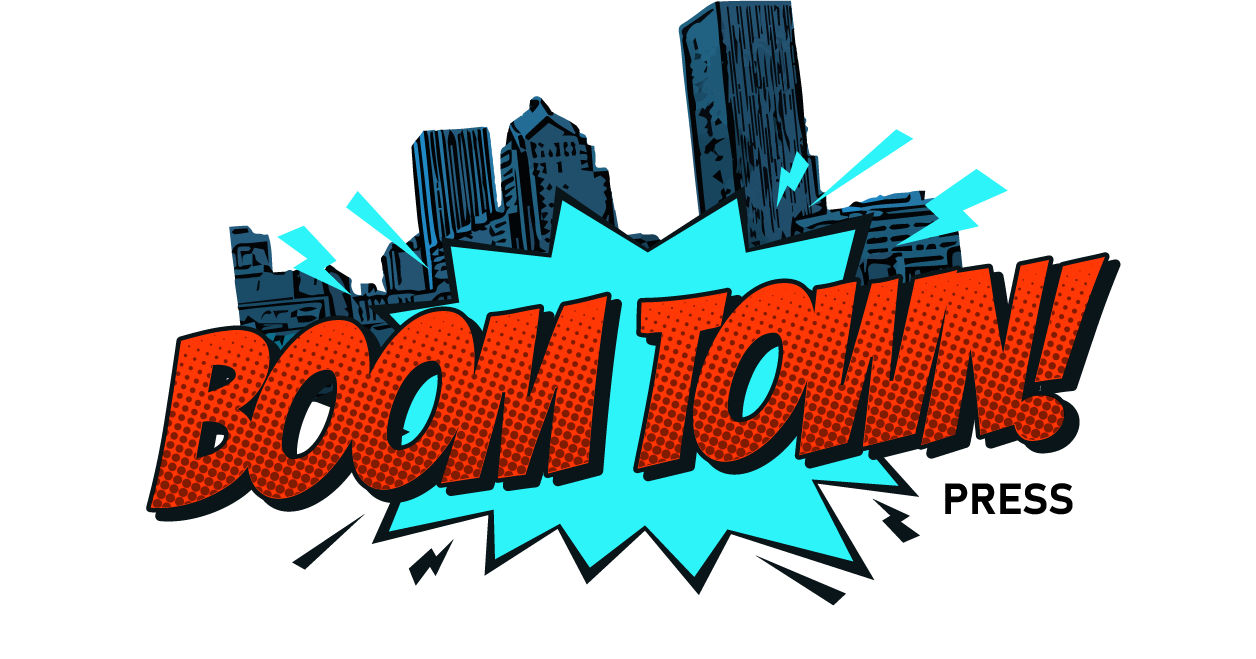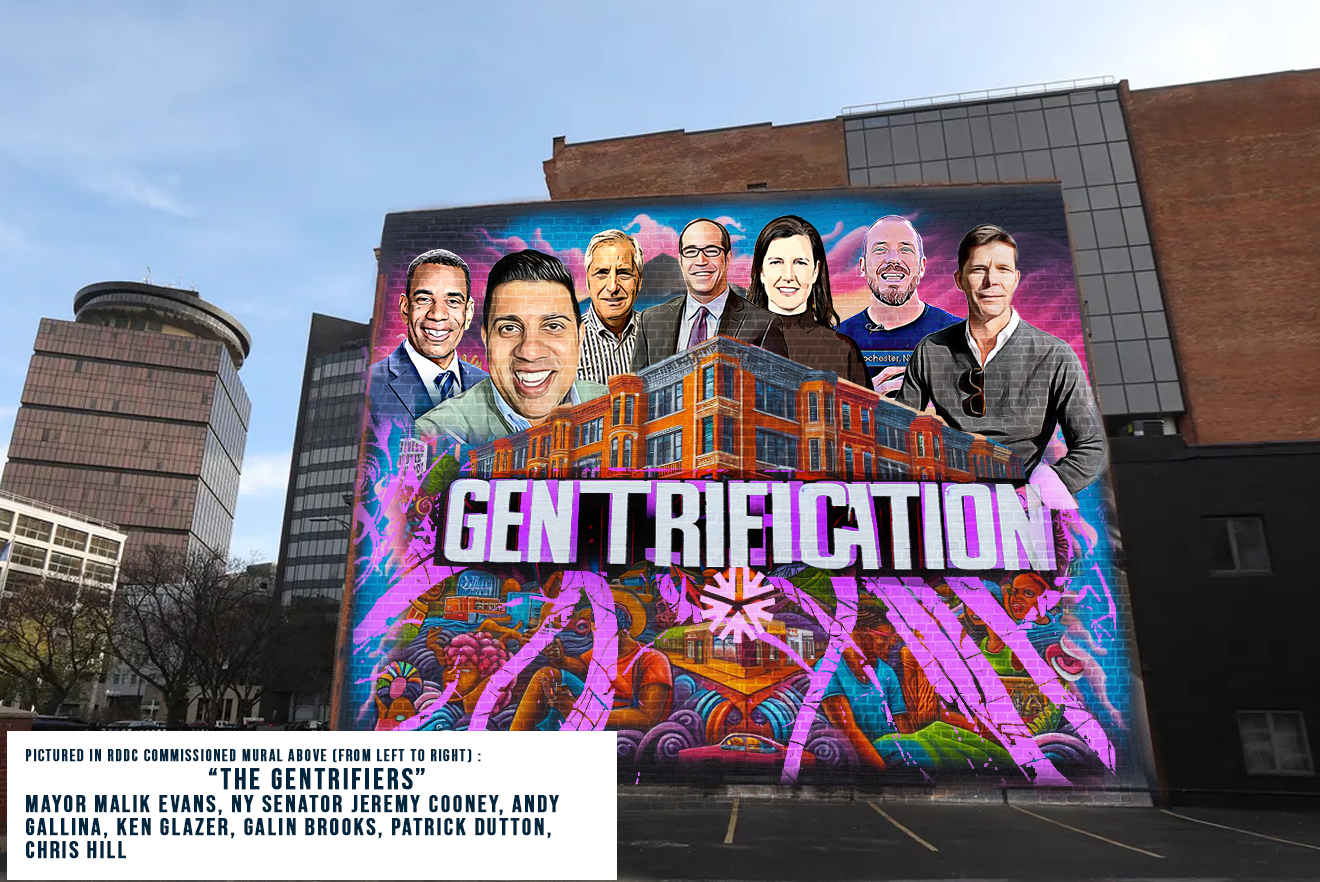|
Getting your Trinity Audio player ready...
|
In a recent turn of events, the Rochester Downtown Development Corporation (RDDC) which also refers to itself The Partnership For Downtown Rochester (PDR) has officially called off its campaign to establish a Business Improvement District (BID) in downtown Rochester. This decision comes amidst significant community pushback, highlighting a triumph of grassroots activism over corporate interests. RDDC’s statement, released Thursday March 21, downplayed the overwhelming opposition to the BID, yet it is essential to recognize the power of community mobilization in producing this outcome.
RDDC’s BID Fails Again
This marks the second time RDDC has sought to turn downtown Rochester into a so-called Business Improvement District that they would manage. Their previous attempt in 2014 ended in failure. Despite their claims of aiming to revitalize downtown Rochester, RDDC’s efforts have been met with staunch resistance from various community stakeholders. Many critics pointed out that the BID would primarily serve the interests of big developers and property owners, exacerbating inequality and disenfranchising marginalized communities.
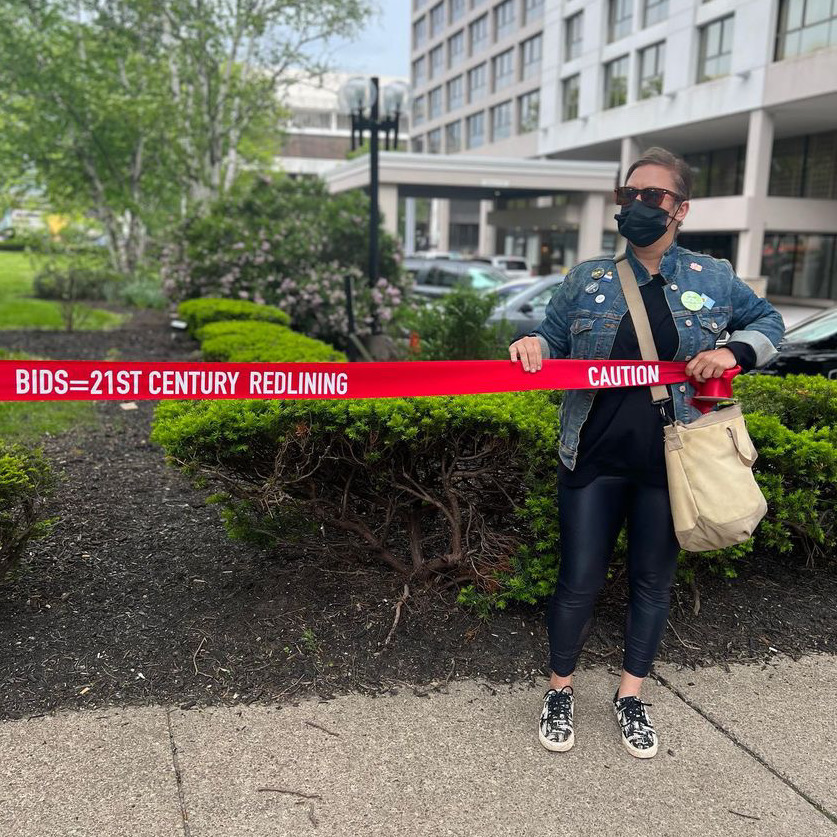
Community Pushback and Coalition Building
The suspension of the BID formation process is a direct result of sustained resistance. A diverse coalition of residents, small businesses, community organizations, and artists united under the name of BID Education Committee to oppose RDDC’s agenda. Over the past two years, these organizers tirelessly engaged with the community, raising awareness about the anti-democratic nature of BIDs and the potential adverse impacts on equity. The most recent public petition had been co-signed by 35 of Rochester’s community organizations, and collected over 1,300 individual signatures. In February a letter asking City Council to stop RDDC’s push for a BID was signed by over 30 storefront businesses located within the proposed BID district, and officially read into the public record by Council member Willie Lightfoot. After months of asking, The BID Education Committee was finally granted the opportunity to present its research and findings to the full City Council through an official ‘work session’ which would be recorded and made public. RDDC’s abrupt cancellation of their own campaign for a BID was announced only three days before this planned work session.
The most recent public petition had been co-signed by 35 of Rochester’s community organizations, and collected over 1,300 individual signatures. In February a letter asking City Council to stop RDDC’s push for a BID was signed by over 30 storefront businesses located within the proposed BID district
RDDC’s Face-Saving Statement and Community Response
In contrast to the groundswell of opposition, RDDC’s email statement portrays the decision to abandon the BID as a matter of lacking political will from Rochester City Council. However, this narrative conveniently overlooks the overwhelming community resistance that apparently compelled City Council to privately reject RDDC’s proposal. By attributing the failure solely to political dynamics, RDDC is attempting to absolve itself of accountability for disregarding community concerns.
Furthermore, RDDC’s statement attempts to portray their community engagement process as legitimate, inclusive, and supportive of the BID. However, the BID Education Committee documented and exposed RDDC’s biased and self-serving approach to community input. Their claim of “unprecedented engagement” fails to acknowledge the widespread opposition and misrepresents the actual feedback given. Their statement read: “After hearing over 1,500 responses to extensive community engagement, one thing was loud and clear: people want more from downtown Rochester.” The proposed BID would have allocated 42% of the voting control over the district’s creation and management of public funds and space to just 15 individuals, who are the largest property owners. What the RDDC still refuses to hear is that the people Downtown, Definitely want direct democracy and not real-estate oligarchs making decisions for them.
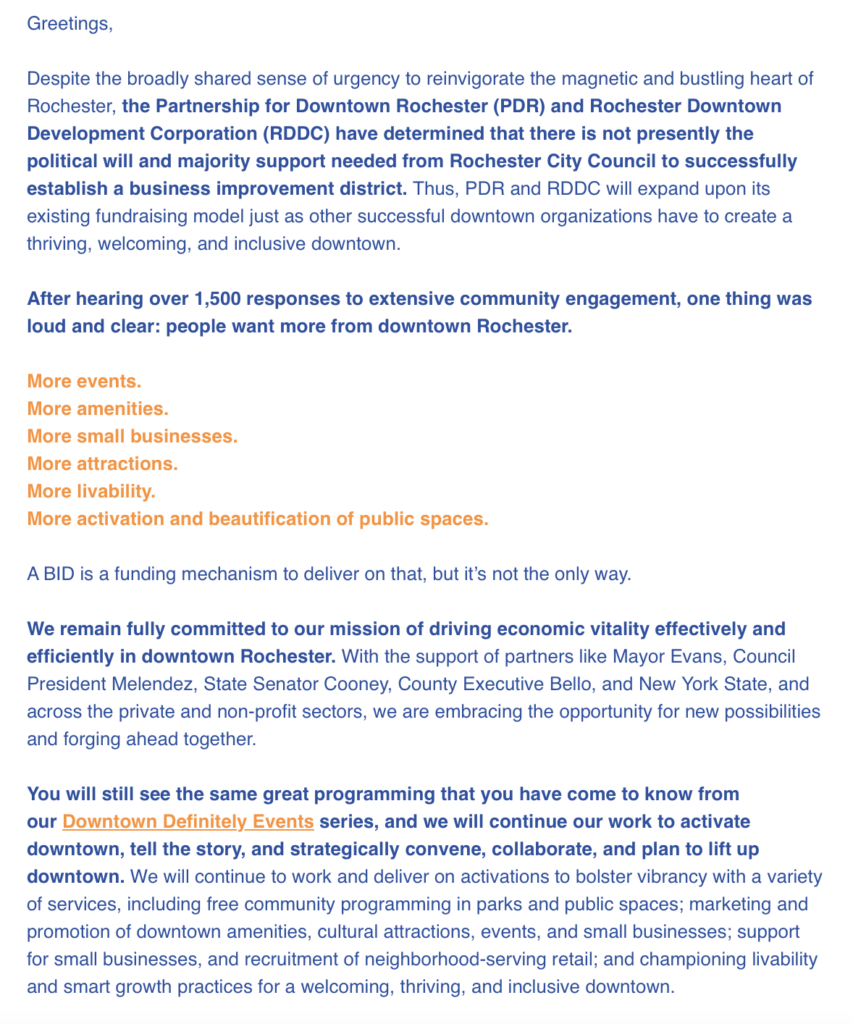
Showing their Cards
Over the last two years RDDC has repeatedly claimed they were running a “long and layered community input process” that was “transparent” and the “people of Rochester were to be kept informed every step of the way”. On numerous occasions they tried to calm backlash by stating that multiple votes would take place, indicating City Council would have the final say. Their surprise announcement that in fact City Council wasn’t supportive of their push for a BID, came as a surprise even to those actively working to oppose the BID. Why did they suddenly abandon the “long and layered” “transparent” process they’d touted all along? Why aren’t they showing their final District Plan? The RDDC’s continued lack of transparency belies a deeply corrupt local process that has caused harm and division in the community, meanwhile they attempt to walk away unscathed.
For the last two years RDDC held our community hostage with their frenetic push for a BID that the biggest downtown property owners would control. Their central claim: Rochester’s downtown is failing and a BID is the only way to fix it. Now, in their announcement, they claim: “A BID is just one funding mechanism to deliver on that, but it’s not the only way.” Translation: We can do what we want, we’ll just have to raise the funds ourselves.
The RDDC has not built the trust needed to be at the forefront of any planning process for our community’s future. Any new plans they hatch must be scrutinized for negative social and racial impact.
Media’s Role
Throughout RDDC’s campaign for the BID, local media played a pivotal role in shaping public perception of the issues, allowing and even supporting RDDC’s efforts to manufacture consent for their plan. Rather than critically examining the proposal, the media (including public media like WXXI/CITY Magazine) often served as a mouthpiece for the RDDC, echoing its narrative of the BID as a panacea for downtown revitalization. Despite growing skepticism and opposition to BIDs, the local media regrettably failed to provide balanced coverage, perpetuating RDDC’s agenda and rarely questioning its validity or implications.
Instead of examining the details of this major policy decision, the media lent credence to RDDC’s biased community input sessions. They uncritically reproduced RDDC’s skewed definition of a BID and relied largely on sources that stood to gain financially from the creation of a BID. In many instances media outlets seemed to diminish the diverse coalition against the BID by reducing them to “a group of artists”. At RDDC’s request, news stories were edited after publication in order to downplay the community dissent and present a more favorable view of the BID. Even upon RDDC’s surprise announcement, local media jumped to reproduce RDDC’s *new* talking points about their pivot and that City Council was to blame. The Democrat and Chronicle failed to mention that 1,300 people and 35 community organizations were opposed to RDDC’s BID, and even seemed to imply that empty sidewalks were the fault of those who came out against the BID. The slanted coverage of the BID underscores the urgent need for stronger independent media to challenge entrenched power structures and ensure transparency and accountability in civic affairs.
Movement Against BIDs
The failure of RDDC’s second attempt to establish a BID signifies an expensive and high-profile setback for proponents of these so called public-private partnerships, and serves as a cautionary tale for similar endeavors elsewhere. Rochester’s BID Education Committee and its extended coalition –part of a burgeoning movement against BIDs– are poised to invigorate community activists in other cities facing similar challenges. While BIDs often provoke intense debate and contention, the public’s awareness of this reality is further obscured by the superficial coverage provided by local media outlets.
During Rochester’s resistance against RDDC’s latest try, numerous other cities grappled with their own struggles over BID proposals. Charleston, SC struggled over a BID which was ultimately created. In Asheville, NC a second BID push is underway after an attempt in 2014 failed. In Hilo, HI community members and small property owners came together to reject a BID in 2024. Despite proponents’ claims of widespread BID success, local coalitions are increasingly wise to the BID playbook. By exchanging insights and tactics, other coalitions are poised to mount stronger opposition to future BID initiatives, buoyed by the lessons learned from recent events in Rochester and beyond.
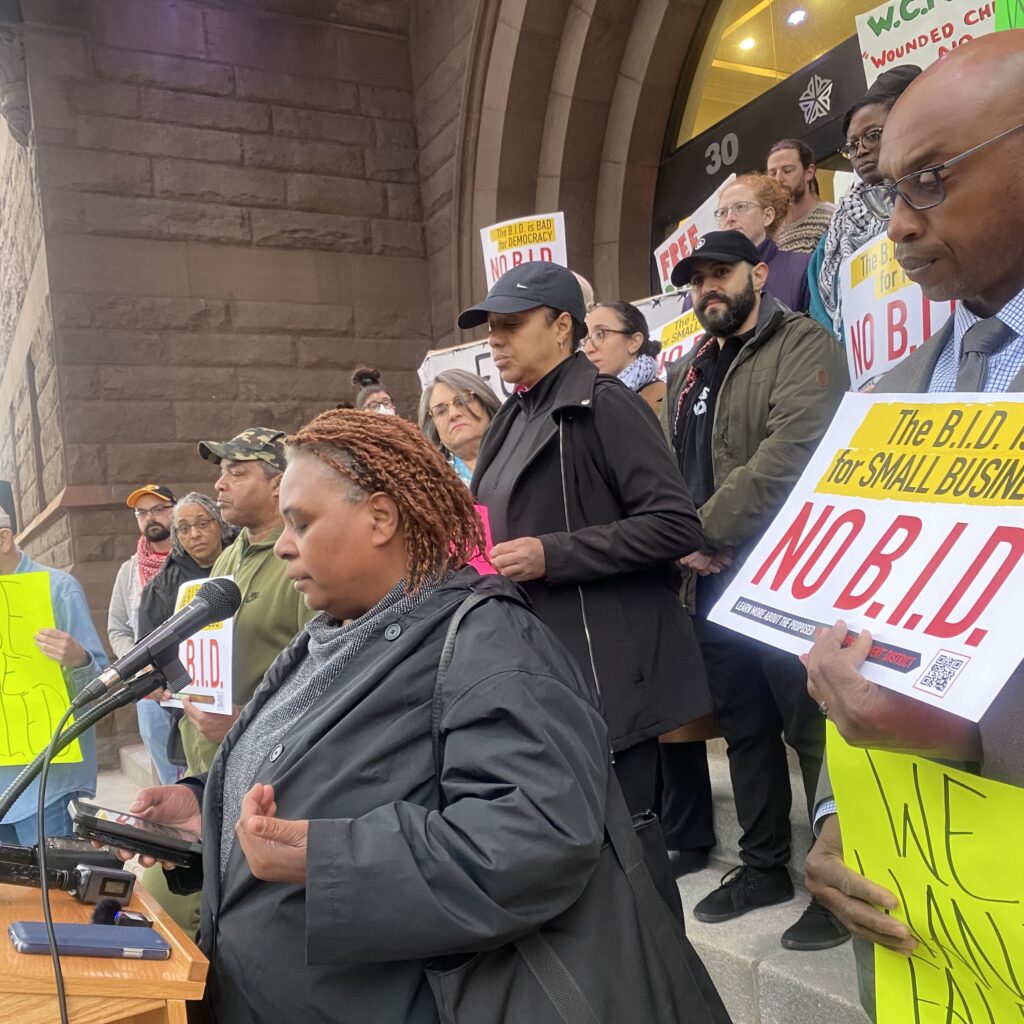
Truth and Reconciliation
RDDC’s quick pivot away from the BID process they’d been touting just weeks prior, and back to business as usual is further evidence that they are out of touch with the majority of Rochester. Their push to create a BID divided our community and caused harm. RDDC’s board and committee members badgered citizens and small businesses who spoke out against the BID. RDDC drummed up fear and anxiety around unhoused populations. They attempted to manufacture consent for a BID through biased surveys. RDDC and their government supporters criticized community advocates for refusing to be counted toward RDDC’s community input quotas, and repeatedly dismissed salient criticisms as “fear”. Backed by the wealthiest developers, the RDDC created an environment of intimidation directed at some of our community’s most marginalized citizens.

Beyond simply manufacturing consent, the RDDC at one point militarized it. In the fall of 2023, the RDDC put on display a SWAT bearcat (a military style, tank-like armored vehicle) at Parcel 5 during one of their “Downtown Definitely” events. Kids were encouraged to play on the machine of war. Ironically, the event series was marketed as providing a “taste of what a BID could do”- inadvertently demonstrating how BIDs colonize public space through policing.
The RDDC’s calling off their campaign has many in our community breathing a sigh of relief, however we cannot simply move on. They must take responsibility for their missteps. For example their Instagram account (@rochesterdowntown) already under fire for being deceptively named as though it is a municipal account, has been quickly scrubbed of their previous posts advocating for a BID. They can’t just delete the evidence of their wrongdoing. Only once RDDC fully acknowledges that their push for a BID was never in the community’s best interest, can they begin to be trusted. Only then can our community begin to heal.
A Cautious Victory for Community Democracy
The suspension of RDDC’s BID campaign represents a significant victory for community democracy and activism. It underscores the power of collective organizing to challenge privatization agendas, and to advocate for a more equitable future. Moving forward, it is imperative for Rochester to prioritize initiatives that genuinely reflect the needs and aspirations of its diverse communities, rather than serving the interests of a privileged few.
RDDC failed to establish a BID for the second time, yet their pursuit of power and profit continues to drive their actions. We must stay involved, demanding transparency and ensuring everyone has access to local government decisions. The lessons learned from this episode should guide future efforts towards inclusive development and democratic decision-making. The resilience and determination of grassroots organizers and community members serve as a beacon of hope for those striving to create a more just and equitable society. The struggle against gentrification, and for self-determination is ongoing. In celebrating this triumph, we must remain vigilant against any future attempts to prioritize profit over people.
